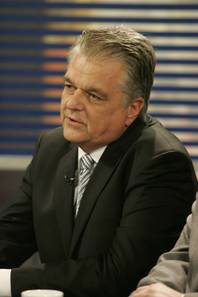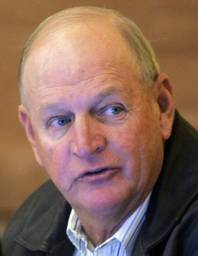Sunday, Dec. 12, 2010 | 2 a.m.

Steve Sisolak

Tom Collins
It’s rare for elected officials — steeped in the practice of maintaining decorum to avoid bad publicity — to erupt during a public meeting. So when Commissioner Steve Sisolak took officials of the Las Vegas Valley Water District to task Tuesday morning, it sent a jolt through a crowd accustomed to dry meetings.
What was he upset about?
Collective bargaining agreements were under consideration by the Water District board, which is the County Commission. During these rough economic times, when Las Vegas’ economy has been laid low, contracts with public employee unions have come under scrutiny.
Pat Mulroy, Water District general manager, said the district has made significant sacrifices and cuts in areas such as longevity pay. So in negotiating with unions, the Water District agreed to a five-year contract that includes salary increases equal to the western consumer price index. Nonunion employees will get the same terms as those negotiated for union employees.
Sisolak didn’t agree with tying salary increases to the price index?
He didn’t. He said that with much of the private sector receiving no annual bump in pay, or losing their jobs altogether, public employees should sacrifice too. He noted that Water District revenue comes directly from residents through water bills. Mulroy countered that as the county enters tough times in its fight for water, five-year contracts are needed to provide stability in her organization and the expertise of longtime employees.
Commissioner Tom Collins said after the meeting that Mulroy is right, and that her employees are coveted by water utilities across the country. Based on the softball questions other commissioners lofted at Mulroy, it appeared they also agree with her.
So what raised Sisolak’s ire?
Facing defeat, he noted that none of the supporting documentation provided an itemized list of how each change in the contract would affect the Water District budget. A new state law requires such an itemized list. The law also requires a public hearing before an elected body votes on a new union deal. That didn’t happen, either.
The Water District’s general counsel, Chuck Hauser, said he wasn’t aware of the law. Sisolak attacked: “This isn’t a law that passed last week, Chuck,” Sisolak said. “Just because you weren’t aware of it isn’t an excuse.”
Commissioner Chris Giunchigliani asked for a vote to postpone a decision on the contracts until the correct information is presented and a public hearing is held.
The contracts will come before the commission at a later date.
But Sisolak wasn’t done. He pointed out that Hauser’s total compensation in 2009, including benefits, insurance and retirement, was about $365,000. He also noted the inherent conflict in having salaried staff negotiate with the union, knowing they will receive whatever is given at the bargaining table.
“It’s unconscionable that nonunion employees, who are doing the negotiating, are going to get the same deal,” he said.
•••
It’s been barely a month since its opening, but the Regional Transportation Commission’s downtown Bonneville Transit Station is being hit by vandals.

Jacob Snow
Jacob Snow, the commission’s general manager, said bathroom partitions, plumbing fixtures, soap dispensers and other bathroom equipment at the Bonneville Avenue and Casino Center Boulevard facility have been destroyed. The damage has cost about $5,000 to repair, a spokeswoman said.
Why was Snow talking about the vandalism?
At the end of the commission’s board meeting Thursday, a man got up during the public comment period and attempted to shame the commission for closing the building overnight. The old transit station, on Stewart Avenue just west of City Hall, was a 24-hour facility.
Snow said after the meeting that solutions are being looked at, but right now because of the destruction there is a reluctance to keep the bus station open overnight. “Unless we’re going to have someone in there as a 24-hour attendant, we’re not going to do it,” he said.
Then what kind of solutions might there be?
The old transit station had bathrooms outside the main building. Perhaps, Snow said, exterior bathrooms might be built for the new station as well. Of course, that would also come at a fairly significant cost — and all because some people simply can’t use someone else’s bathroom without soiling it.

Join the Discussion:
Check this out for a full explanation of our conversion to the LiveFyre commenting system and instructions on how to sign up for an account.
Full comments policy